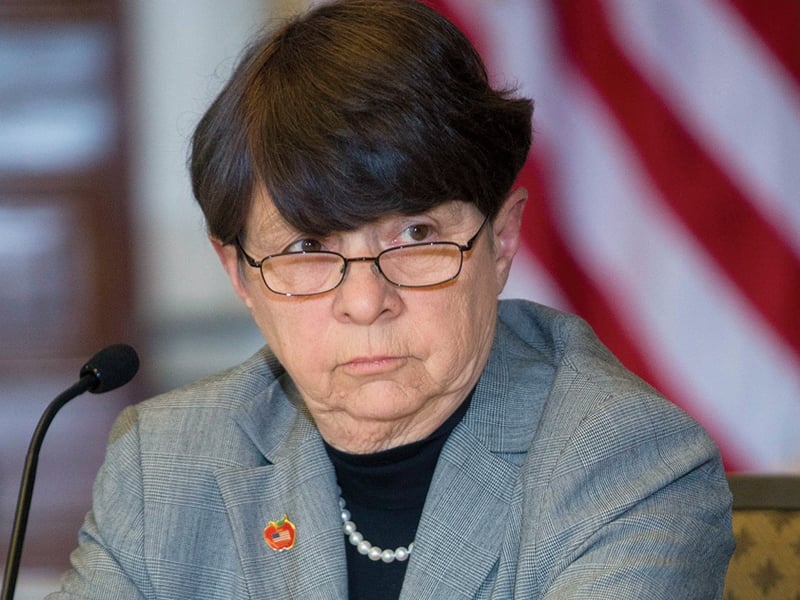Securities and Exchange Commission Chairwoman Mary Jo White said Friday she will push the agency this year to make a decision on whether to raise investment advice standards for brokers — but again declined to provide a timeline for agency action.
Democratic SEC Commissioner Luis Aguilar, who supports a fiduciary-duty rule, is not confident the agency will make progress this year.
“I have been frustrated that seven years into my tenure we remain where we are, at square one,” Mr. Aguilar told reporters on the sidelines of the Practising Law Institute conference, where Ms. White spoke in Washington on Friday. “I'm hoping that Chair White will move us off square one, but quite frankly, I need to see more action from the staff before I buy into the fact that we're actually going to move.”
The SEC has been wrestling for years with whether to promulgate a rule requiring anyone providing retail investment advice to act in the best interest of their clients, a bar that investment advisers but not brokers currently meet. The Dodd-Frank financial reform law gave the SEC the authority to propose such a rule.
Consideration of a fiduciary-duty rule is among “important priorities that will occupy us in 2015,” Ms. White said at the PLI conference.
Ms. White's mention of fiduciary duty
consumed 12 words of a 2,959-word speech. She spent much more time elaborating on other priorities, such as reforming market structure, assessing systemic risk posed by asset managers and finalizing rules to help small businesses raise capital.
In a meeting with reporters after the speech, she didn't elaborate on a timeline for commission consideration of fiduciary duty.
“It's been a priority of mine to get the commission in a position to make the decision,” said Ms. White, who became SEC chairwoman in April 2013. “It remains a priority to do that.”
The issue has
caused a split among the five SEC commissioners, with Republican members Daniel Gallagher Jr. and Michael Piwowar warning that they wouldn't support rulemaking.
While the SEC is mulling a rule, the Department of Labor is
poised to re-propose its rule that would require more financial advisers to retirement plans, including brokers who sell individual retirement accounts, to act in the best interest of their clients.
In a speech at the PLI event,
Mr. Gallagher blasted the pending DOL rule, calling it a “runaway train,” as well as a recently leaked
White House memo supporting it. He argued that a ban on conflicts of interest would hurt smaller investors, who are better served by the current regulatory regime that seeks to mitigate conflicts through disclosure.
“Investors benefit from choice — choice of products and choice in advice providers,” Mr. Gallagher said. “This is something the nanny state has a hard time comprehending. The White House memo is thinly veiled propaganda designed to generate support for a widely unpopular rulemaking.”
Fiduciary proponents say the rules will strengthen investor protection against conflicted investment advice that could raise the fees they pay to financial advisers. But fierce opposition from the financial industry includes the argument it would significantly raise regulatory and liability costs for brokers and force them to drop middle-income clients with modest investable assets. Industry reaction to a potential SEC rule has been mixed.
Ms. White declined to say whether she favors a fiduciary duty rule.
“It is a very important area that is complex and needs to be considered very carefully,” Ms. White said. “In the short term, I will be speaking about my position.”
Her comments were
similar to those she made in November at the Securities Industry and Financial Markets Association annual meeting in New York. Almost a year ago at a Consumer Federation of America meeting, she said she
instructed SEC staff to draft a document that would give commissioners a list of options on how to address raising investment advice standards.
Although she has been reticent about fiduciary duty, Ms. White has “devoted some considerable time to getting up to speed” on the topic, said Barbara Roper, CFA director of investor protection.
“She appears at this point to be well-versed on the issue and understands where the challenges are in developing a strong and effective rule,” said Ms. Roper, who recently met with Ms. White. “We remain hopeful that this will be the year. This should have happened four years ago.”







